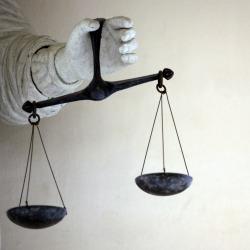BOB GARFIELD: On Monday, DC Federal District Judge Richard Leon issued a surprise injunction with, it was reported, wide implications for NSA surveillance. He described the agency's massive metadata gathering as quote, “an almost Orwellian exercise of unreasonable search and seizure, writing, quote, “Surely such a program infringes on that degree of privacy that the founders enshrined in the Fourth Amendment.” Leon ordered the NSA to stop collecting the data on two plaintiffs and to destroy their, although he stayed the injunction pending the inevitable appeal.
Aziz Huq is a professor of law at the University of Chicago, who studies constitutional law and national security. He says that the prospects for Leon's decision surviving the appeals process are remote.
AZIZ HUQ: Judge Leon’s opinion will be appealed to a very conservative court of appeals, the DC Circuit and then, even if were to survive in the DC Circuit, would go up to the Supreme Court. The Supreme Court’s been very cautious with respect to surveillance issues.
BOB GARFIELD: Apart from the vulnerability of the decision in the appeals process, you believe that Judge Leon could end up affecting the law but through a, an entirely different route, legislative. Senator Dianne Feinstein has a bill in play, which is deemed quite hawkish on intelligence and security. Is it your guess that this decision will make it harder to pass such legislation?
AZIZ HUQ: Judge Leon’s decision, if it were taken seriously, suggests that at least parts of the Feinstein proposal are unconstitutional, that there’s a need for much closer judicial scrutiny of the government’s both collection and use of telephonic or, by extension, Internet metadata. And if members of Congress and their staffs read and take seriously Judge Leon’s decision, as I think that they should, I think that they would have to reject the Feinstein proposal in favor of some of the, the less hawkish proposals like people like Senator Wyden have put on the table.
BOB GARFIELD: Now, you’ve also imagined a scenario, have you not, in which Judge Leon's decision actually boomerangs in Congress and lends supports to be giving NSA more leeway in its intelligence gathering and, and application of the metadata. How does that play out?
AZIZ HUQ: Imagine a scenario in which Judge Leon’s decision is rapidly reversed by the DC Circuit, which is quite a conservative court. With that reversal in hand, someone like a Senator Feinstein or some, somebody else in the Senate or the House could well say, look, any kind of privacy concerns that people have identified here are really overblown. That might lead to the enactment of a new set of regulations which basically legalizes much of what many people see as troubling in the NSA’s programs.
BOB GARFIELD: There was a historical reason that you think that this could boomerang around in the way that you described. What is that?
AZIZ HUQ: The last time there was a major revelation about government surveillance, which was the revelation of the Terrorism Surveillance Program by the New York Times, the legislative reaction to that was to retroactively immunize the telecommunications providers for their illegal participation and to enact a law that supposedly restrained the National Security Agency, that, in fact, granted it new powers that it had not had prior to 2007. So, rather than say, oh no, we need to rein in the agencies, what Congress did is say, oh no, we need to give these people more flack.
BOB GARFIELD: Now, there’s one scenario we haven't discussed but I want to run it past you. The plaintiff in this case was a guy named Larry Klayman who is – I guess the kindest way of saying it is he’s quite a conservative gadfly and very litigious and does some pretty zany things through the courts. [LAUGHS] Do you think there’s a chance that you’re wrong and that Judge Leon's decision will be upheld all the way to the Supreme Court and someday people like you will be teaching students about Klayman?
AZIZ HUQ: It’s a problem of small numbers. The federal judiciary is composed of a very small number of people. Whenever a new issue comes up, one can try and guess what those people’s views will be, based upon what they’ve done in the past. That kind of prediction, which is a prediction about what somebody who you don’t know very well is going to do on something entirely new is really tough.
And, actually, Judge Leon’s a really good example of that. Judge Leon is a Bush appointee. He’s a quite conservative judge. He, on many other national security issues, such as Guantanamo, has taken a relatively hard line. This is not the kind of opinion that you would have expected him to reach.
BOB GARFIELD: Aziz, thank you so much.
AZIZ HUQ: Thank you, Bob.
BOB GARFIELD: Aziz Huq is a law professor at the University Of Chicago and has litigated civil liberties claims before the government.
